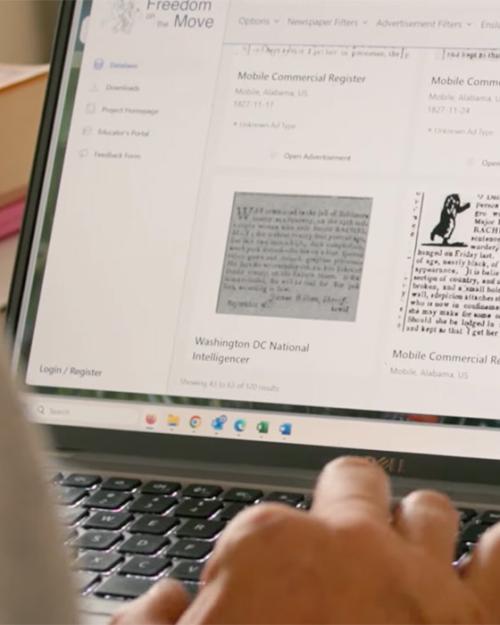A research project collecting records of freedom-seeking enslaved people in the pre-Civil War U.S. came to a halt when researchers received a stop-work order from the National Endowment for the Humanities in early May. In many cases, they are the only written records of these people.
Enslavers posted as many as a quarter million newspaper ads and flyers before 1865 to locate runaway slaves, in slaveholding states and northern states as well. The public crowdsourcing project, Freedom on the Move, has digitized tens of thousands of these advertisements in an open-source site accessible to the public. Without a concerted effort to collect and digitize these ads, the names, faces, personalities and sense of individuality of these freedom-seekers might otherwise be lost to history.
The database has historical value on several levels, said Ed Baptist, professor of history in the College of Arts and Sciences and a principal investigator on the project.
“It puts a human face on history, it teaches us that ordinary people can resist profoundly evil systems,” he said. “It reminds us that enslaved people were not faceless robots. They had will and courage and the power to resist slavery, and they did so. And in doing so they changed human history. Their resistance helped bring about the Civil War and the end of slavery itself.”
For genealogists and for the tens of millions of people related to those who were enslaved, these records provide an unparalleled opportunity to glean details of what they were like. “The vast majority of the 48 million Black Americans alive in 2025 might be able to find some of their ancestors in the ranks of the people advertised for the ‘crime’ of trying to free themselves from slavery,” he said.
While the words are written by their slaveowners and oppressors, character and personality frequently shine through. From an 1849 ad in the Daily Picayune newspaper of New Orleans:
“$100 reward for the delivery of Brazile in either of the city prisons. He ran away last July, has been seen dressed in women's clothes several times in the city and also in genteel male apparel. He is a regular attendant of the balls, speaks French and English, is about 21 years old, a dark mulatto or copper color, has a Roman nose, rather slender genteel person. He formerly belonged to Henry Hopkins Esquire of the city. He came from Charleston, South Carolina five years ago and has the Charleston brogue when speaking English. Inquire at number 73, Baronne Street.”
While grants from the NEH tend not to be enormous, Baptist said, this one was a significant matching grant: $1 for every $4 raised, up to $750,000 awarded, for a total of $3 million. To date they have raised $1.5 million from other sources, with approximately $375,000 from the NEH. The grant started in 2021 and was slated to finish at the end of 2026.
According to Baptist, the stop-work order eliminates a couple of staff and graduate research positions and imperils people’s funding at Cornell, as well as a sub-award at Howard University.
Without online access to these digitized records, Baptist said, details about people trying to escape slavery would be difficult or impossible to find, which makes preserving the documents even more urgent.
“Everything decays and has to be renewed,” Baptist said. “Paper newspapers start to fall apart over time, microfilm decays and gets harder to read. It’s expensive to digitize things and companies want to keep things behind a paywall. Creating this and putting it out there in usable formats, and storing it in multiple places, ensures its safety.”




